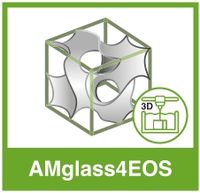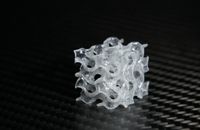AMglass4EOS Design and material optimization of AM glass for elektrolyzers in organic synthesis |
Motivation: The performance of electrolyzers can be limited on the device side by the manufacturing restrictions of corrosion-resistant materials. Optimized components and novel functions in electrolyzers can be realized with a process that can produce intricate, inert and non-conductive elements. Additive manufacturing of fused silica glass is such a process.
The establishment of additively manufactured glass for electroorganic synthesis requires knowledge about the constructive possibilities and manufacturing limits as well as inspiring application examples. Adapted materials can extend these boundary conditions. This knowledge is the basis for complex additively manufactured glass components and enables universal solutions for global challenges in organic synthesis.
Aims and approach: In AMglass4EOS, KIT IMVT and Glassomer GmbH are jointly researching the possibilities and limits of AM glass in the context of electrolyzers. The project partners are developing restrictive and opportunistic design guidelines. With these, design solutions for the challenges of electrolyzers are created. These will show the potential of this technology and provide inspiration for further applications. Glassomer optimizes its material formulations for lattices and other structures. For scaling up to larger electrolyzers, this know-how will be transferred to other manufacturing processes suitable for mass production.
Innovations and prospects: Additively manufactured glass is a new technology for electrolyzers that offers a great deal of freedom for the design of systems and components. AMglass4EOS explores the possibilities and limits of the application and develops concrete design solutions. The research results are prepared in such a way that they can be disseminated quickly within the ETOS future cluster and beyond.
Coordinator:
Christoph Klahn (KIT) christoph.klahn@kit.edu

